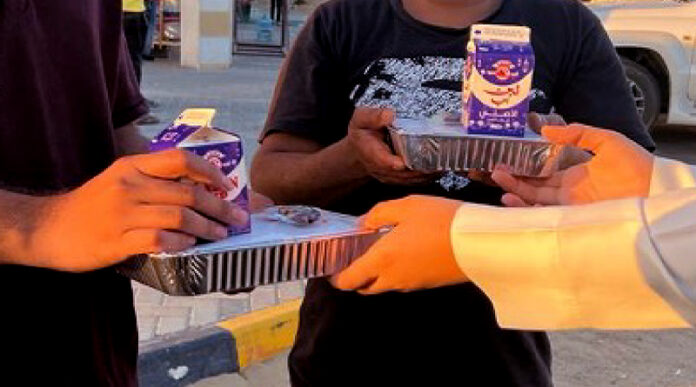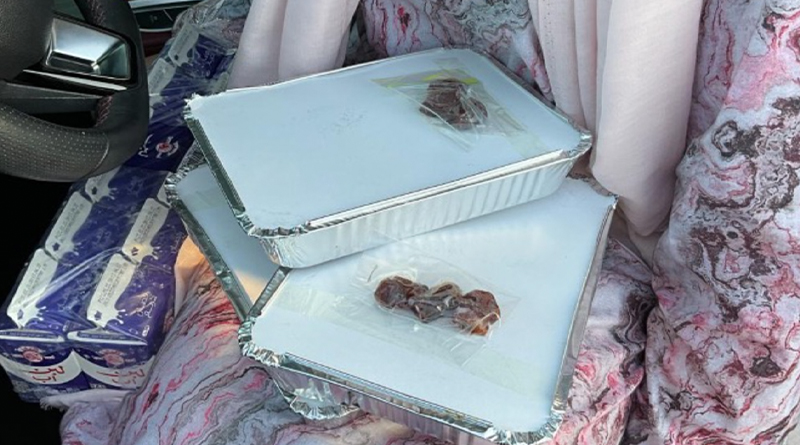By Meera Shaheen
During the month of Ramadan, I grew up waking up to the smell of cooking, the smashing of pots and much chaos coming from the kitchen. Food was made in bulk, made for everyone in the neighborhood, anyone passing by and every single member of the household.
The holy month of Ramadan is observed across Muslim households and cultures. For 30 days, Muslims fast from sunrise to sunset and engage in good deeds to enhance their relationship with God. But why was my grandmother in the kitchen cooking large batches of food? I never understood until we started helping. It was embedded in our Emirati culture.
The month of Ramadan is a time for giving. Muslims are encouraged to make donations to charity and help those in need. This can be done via contributions, volunteering, or other acts of charity.
Every year, my friends, neighbors and the rest of Emirati society share common traditions in the holy month of giving. These traditions are old and have shaped the Emirati people. We host large iftars for friends and family, share every dish on our table with neighbors and give the poor and needy even more during the holy month.
Emirati traditions have long shaped the nature of giving; this way everyone feels as though they are one.
By 11 a.m. the kitchen is busy with preparations. The chaotic process often includes yelling, saturated with care of course. Personally, in my house, the food being prepared is made for the neighborhood first before the household members. This might seem an insignificant detail, but I think it encapsulates the Ramadan spirit perfectly.
By 5 p.m., the food is expected to be finished and ready to be distributed in the neighborhood.
Shaheen Yousif, an Emirati father, yells, “yallah, yallah send the driver to give out food to workers and mosques before sunset.”
A variety of dishes is distributed by different drivers of Emirati households to mosques, houses around the neighborhood and most importantly, large groups of workers sitting on scolding pavements under the unforgiving sun.
Since these traditions and acts of kindness have existed for a long time, they have become embedded in the Emirati culture. It is now the norm. So, how could a day pass without giving to the poor? It simply would not.
It became the norm to pass by the kitchen and find my grandmother with her army of cooks, each with a specific role, toiling away to produce a feast. With her spatula in hand, sitting cross-legged on the kitchen floor stirring the large pot of harees – an Emirati dish of beaten wheat and meat – enough to feed at least 200 people, she commands a fleet of women.
The best part though this tradition exists in many Emirati households. Dishes of different types enter and leave our house at the same time, a common practice shared by many.
As we gather around the iftar table, every foreign plate tells the story of a close-knit community.
Dalia Orario, a Filipina nanny who has worked in an Emirati household for 16 years, says, “although I’m not a Muslim I always feel the obligation to cook and give the needy. Ever since I came to the UAE, up to this day I have watched and been part of these beautiful Emirati traditions.”
Harees, Qaimat and Machboos are Emirati dishes found on iftar tables and distributed in neighborhoods.
In the seven emirates, streets and neighborhoods are decorated with festive lights to celebrate the holy month. These lights are different shapes of lanterns, crescents and stars to create the sense of festiveness and belonging amongst the community.
Other motivations and encouragement for the continuation of these traditions include videos on social media of young Emiratis cooking for large numbers of people, or volunteering with charities to give out food at traffic lights.
It is common to see tents and tables outside Emirati houses that give food and drinks to anyone breaking their fast. Some houses provide iftars and buffets on pavements for people passing by, especially for workers.
These initiatives and traditions further encourage neighbors to engage in good deeds and the enhancement of the spirit of togetherness.
Ghayah Alhosani, an Emirati university student says, “my family cooks meals daily for workers that pass by in the neighborhood. It is a daily routine to stand outside with my mother handing plates of food, water and dates out.”
No matter which neighborhood you end up passing by, there will always be lines of people standing outside houses waiting for their share of food before the sunset and mosques begin their call for the Maghrib prayer.
So, why was my grandmother on the kitchen floor stirring large pots of food?
It is the Emirati twist to the holy month of Ramadan.



















